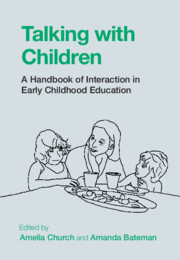Book contents
- Talking with Children
- Talking with Children
- Copyright page
- Dedication
- Contents
- Figures
- Tables
- Contributors
- Acknowledgements
- Notes on Transcription Conventions
- Introduction
- Part I Talk as Social Action
- Part II Pedagogy in Interaction
- Part III Interaction and Inclusion
- 15 Play
- 16 Mental Health and Wellbeing
- 17 Neurodiversity
- 18 Friendships
- 19 Conflict
- 20 Morality
- 21 Families
- Index
- References
20 - Morality
from Part III - Interaction and Inclusion
Published online by Cambridge University Press: 16 June 2022
- Talking with Children
- Talking with Children
- Copyright page
- Dedication
- Contents
- Figures
- Tables
- Contributors
- Acknowledgements
- Notes on Transcription Conventions
- Introduction
- Part I Talk as Social Action
- Part II Pedagogy in Interaction
- Part III Interaction and Inclusion
- 15 Play
- 16 Mental Health and Wellbeing
- 17 Neurodiversity
- 18 Friendships
- 19 Conflict
- 20 Morality
- 21 Families
- Index
- References
Summary
In this chapter we explore the moral interactional work that preschool teachers and children accomplish in everyday preschool practices. We explore how teachers solicit accounts in assisting the children to remedy a problematic conduct of excluding a child from play. It will be shown how the children justify their actions to avoid being blamed for faulty conduct. In their response the preschool teachers use hypothetical scenarios to avoid blaming and instead modeling the children’s actions and feelings to experience the hurt feeling by a peer. The study shows how an EMCA approach can provide insights into how childhood educators socialize children into accountability and compassion while maintaining a democratic ethos.
Keywords
- Type
- Chapter
- Information
- Talking with ChildrenA Handbook of Interaction in Early Childhood Education, pp. 405 - 425Publisher: Cambridge University PressPrint publication year: 2022

